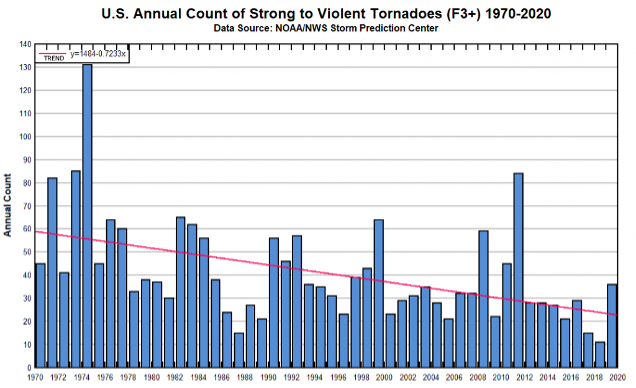
Heartland By H. Sterling Burnett | Dec. 16, 2021
Climate Change Weekly #420
In the aftermath of the terrible and deadly multiple tornado strikes across several states on December 10, President Joe Biden and the woke parrots on his climate team wasted no time in linking the recent tornado disaster to climate change.
In his Saturday morning media briefing discussing the tragedy, here’s how Biden responded to a question about whether the timing and severity of the tornadoes were due to climate change:
Well, all that I know is that the intensity of the weather across the board has some impact as a consequence of the warming of the planet and the climate change. …
The specific impact on these specific storms, I can’t say at this point. I’m going to be asking the EPA and others to take a look at that. But the fact is that we all know everything is more intense when the climate is warming—everything. And, obviously, it has some impact here, but I can’t give you a—a quantitative read on that.
With Biden’s marching orders in hand, the U.S. Environmental Protection Agency is diverting resources from monitoring air, water, and toxic waste pollution across the nation, the job it is charged by law with doing, to investigate the role of climate change in the recent tornado outbreak. I have no doubt that Biden’s climate-alarmed EPA will attribute the tragedy to human fossil fuel use even though no such link exists, as discussed below.
Deanne Criswell, Biden’s administrator of the Federal Emergency Management Agency (FEMA), was even more emphatic in placing the blame for the December tornadoes squarely on climate change.
“This is going to be our new normal,” Criswell announced on CNN’s State of the Union. “The effects we are seeing of climate change are the crisis of our generation.”
While acknowledging it is not unusual for tornadoes to strike in December, Criswell asserted “at this magnitude, I don’t think we have ever seen one this late in the year.”
The facts show Biden and Criswell are simply wrong.
In its recent Sixth Assessment Report, the U.N. Intergovernmental Panel on Climate Change finds no evidence most weather events are becoming more extreme, including tornados. As detailed in a summary of the IPCC’s conclusions on extreme weather by the University of Colorado’s Roger Pielke Jr., “it is simply incorrect to claim that on climate time scales the frequency or intensity of extreme weather and climate events has increased for: flooding, drought (meteorological or hydrological), tropical cyclones, winter storms, thunderstorms, tornadoes, hail, lightning or extreme winds (so, storms of any type).”
Concerning tornadoes in particular, the IPCC states, “There is low confidence in observed trends in small spatial-scale phenomena such as tornadoes.”
As discussed in “Climate at a Glance: Tornadoes,” the number of tornadoes has been declining for the past 50 years, and the number of strong tornadoes, F3 or higher, has dramatically declined over the past 50 years, as shown in the figure below.

For Criswell to claim “at this magnitude, I don’t think we have ever seen one this late in the year,” displays a woeful, likely willful, ignorance on her part, indicating her statements are intended to gin up support for Biden’s climate agenda in Congress and among the public at large rather than reflect the truth.
In 2015—just six years ago—on December 26, 27, and 28 a weather front produced multiple tornadoes across a wide swath of the Southern United States, centered mostly in North Texas. On December 26 alone, 32 tornadoes of various strengths struck North Texas. One tornado, an EF4, struck very near my home in Rowlett, Texas, destroying more than 400 homes and 22 businesses, injuring more than 400 people, and killing 10. On December 5, 1953, when the Earth was entering a cooling period, an F5 tornado devastated Vicksburg, Mississippi, killing 38. On December 18, 1957, an F5 tornado struck Sunfield, Illinois, killing 13, at the beginning of a three-day series of tornado strikes across the South and Midwest.
Doddering Joe, with his flagging grasp on history and day-to-day life, may be excused for not remembering a terrible tornado outbreak in late December just six years past, but there is no excuse for Criswell’s ignorance. If she does have this limited a grasp on tornado occurrences to which the agency she heads was deeply involved in responding, she is unqualified to lead FEMA. Criswell was probably aware of these past events but chose to ignore them for political reasons, which is shameful though not surprising, coming from a Biden administration that constantly “disappears” any climate data that undermines alarming claims about recent extreme weather events being unusual. That, too, disqualifies her for office.
Instead of trying to promote their climate change policies by “not letting a disaster go to waste,” to paraphrase Democratic operative Rahm Emanuel’s famous dictum, the Biden administration should do its job of providing comfort and aid to the people suffering in the aftermath of these storms. That’s the moral choice.
SOURCES: Fox News; Climate at a Glance: Tornadoes; New York Post; The Guardian



